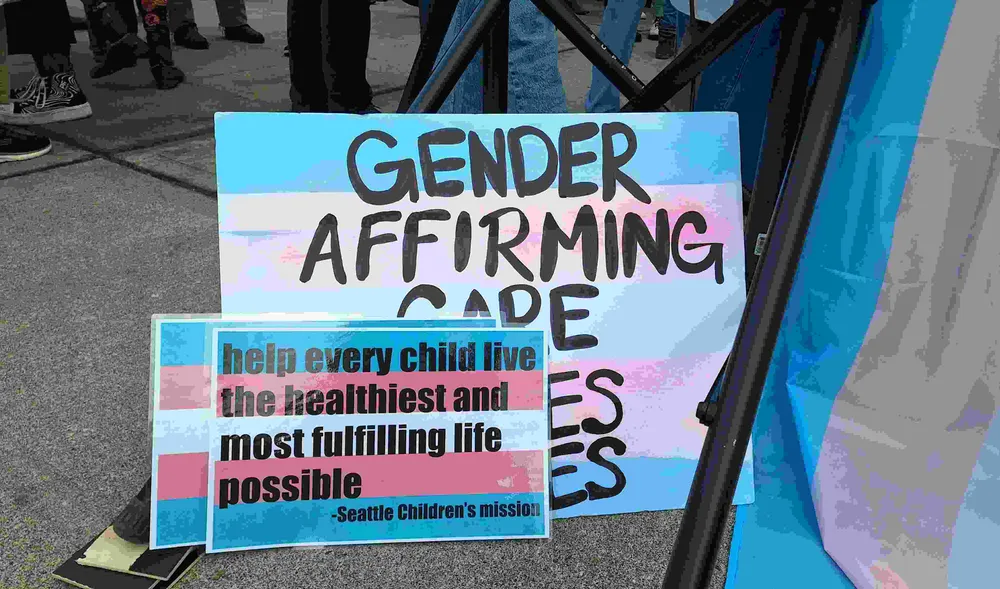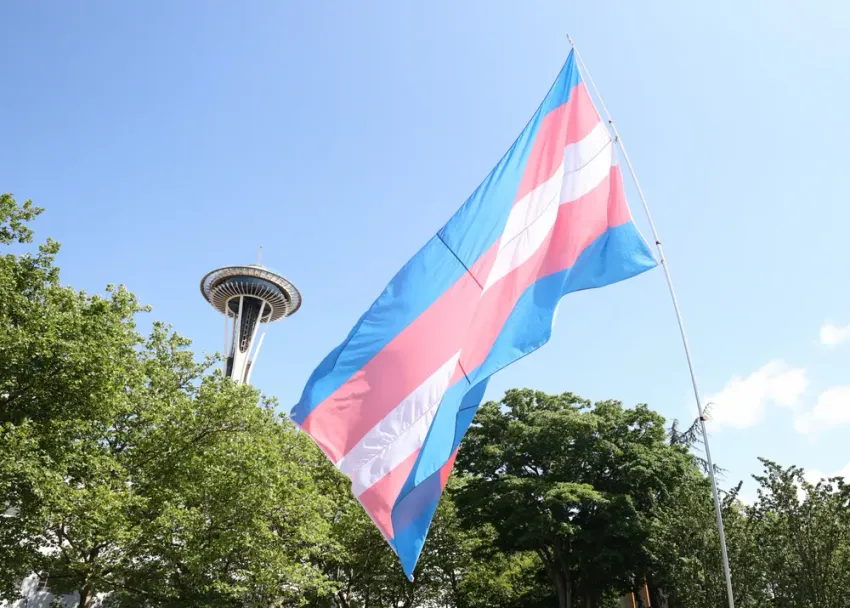Living somewhere with tons of Transgender people is one of the greatest joys in my life. Every Trans person should have that opportunity, and live their lives with full access to supportive resources and freedom from persecution.
This guide gives direction and guidance to those relocating to and living in Washington, primarily those fleeing red states looking for a more welcoming home with better legal and societal protections for Trans people. It answers common questions and connects people to resources and advice. There’s a network of peer navigators to work with people directly and help them relocate and find their footing here.
Considerations before moving
Most of these considerations apply to both Seattle and Western Washington (but may be better or worse outside of the city). We recommend talking with someone more in-depth before relocating.
Seattle is expensive, and many surrounding areas also have much higher rent and food costs than elsewhere in the US. Seattle’s median monthly rent is $2,000, and even the smallest, cheapest apartments will cost $900 a month if you’re lucky. This forces many onto the street, and shelters and homeless services have extremely long waitlists or limited service. Surviving on social services alone is also very difficult in a city so expensive. The minimum wage is higher than in other places, but savings can run out fast, and going without work even briefly can present a risk of homelessness. Also, in the summer, we have regular heat waves that can be dangerous without A/C. Tip: Apply for jobs and find a living space before coming.
Seattle’s about 70% white — substantially higher than the US average, and 1.5 to 2 times higher than most large cities. While some communities of color have grown in population in the past 20 years, gentrification and rising rents have forced many out of the city. Partially due to the long history of redlining, most communities of color are concentrated in areas south of the city center. These histories and present experiences of exclusion, racism, and/or white-centeredness are present in Trans communities as well as cis ones.
Seattle’s accessibility varies by neighborhood, and many walkable areas are hilly and may present issues for wheelchair users. Transportation is strong in some areas and lacking in others.
Seattle is Trans. This is a huge plus for many of us, but the high population also means increased visibility. You’ll still face transphobia in Seattle, even if it’s less often or from those who consider themselves allies. Additionally, you’ll likely be assumed to be Trans more often in a way that makes being “stealth” slightly less common. Depending on where you live in Seattle, people may assume you are Trans — even if you’re just a tall cis woman. Trans communities here are robust and wonderful, but it is plausibly less likely to be seen as cis in your average interaction with a stranger here — with all the pros and cons that come with that.
Renter-focused housing
Costs in major cities from most to least expensive:
1. Seattle
2. The Eastside (Redmond, Bellevue, Kenmore)
3. Tacoma
4. Olympia and Bellingham
5. Spokane and Yakima
If you don’t drive, check WalkScore to view transit and pedestrian accessibility. If you don’t drive, try living near a light rail station. There’s one major line, which will help you get to most other areas in the city. You can use a transit card called an ORCA card for the light rail, King County Metro, buses, and ferries.
Familiarize yourself with Seattle renter and Washington resident rights, what the Washington Tenants Union is, and rent increase price caps. Market-rate apartments can be found at apartments.com, rent.com, Craigslist, Zillow, Redfin, and more. The further out you get from Seattle’s center, the cheaper rent gets.

Finding roommates
Housing with roommates is usually the cheapest option. Roomies.com has an area search with an “LGBT+ friendly” toggle for “Rooms” and “Roomies.” Keep in mind that these people may or may not be Trans-friendly in particular, but it can be a good starting point.
You can also post on Lex, a Gay Craigslist app. There’s a Seattle housing chat and a small Seattle QTBIPOC housing group. Reach out if you want an invite to either.
Other housing resources include the following:
- Seattle Queer Housing (Facebook)
- Seattle Queer Housing Exchange (Facebook)
- Seattle Trans and Queer Housing Network (Facebook)
- Bellingham Queer Housing Group (Facebook)
- Spokane Queer Housing Group (Facebook)
- Tacoma Queer Bulletin Group (Facebook)
- Queer Exchange Olympia Group (Facebook)
- Seattle “Fuck Landlords” Gay Housing Association (Telegram)
- Seattle Area Queer Housing (Telegram)
Low-income apartments
There are affordable housing buildings operated directly by regional housing authorities and partners, Multifamily Tax Exemption (MFTE) units, and housing choice vouchers/Section 8, also known as rental assistance. The median income in Seattle and Washington is high, so you may qualify for these even if you think you don’t. Use aptfinder.org to look for dedicated affordable housing options.
Note: Most affordable housing units take several weeks after application submission to verify your eligibility, and most cities and counties have housing authorities that administer similar programs.
MFTE is a program in some cities that offers cheaper, income-restricted apartments in otherwise market-rate buildings. Visit MFTE-Seattle.com.
Rental assistance
The city pays a fixed amount toward your rent while you live in a market-rate apartment via Section 8. Drawing is done randomly, so you might get it fast or never. You have to make under 30% of the area median income and be or have been homeless.
Many Section 8 housing choice vouchers don’t require proof of current residency to apply. If you already have Section 8, you can transfer your vouchers to a new city via a process called portability. Contact your current provider, and they’ll explain the process, then contact the housing authority at your destination to verify availability.
As of April 8, 2025, the Section 8 waitlists in Spokane, Olympia, Renton, and King County (other than Seattle) are closed. Waitlists are open in Seattle, Tacoma, and other cities. There are also emergency rental assistance programs for currently housed people in danger of losing that housing. Byrd Barr is one option in Seattle. Check 211 for more options.
Low-income housing by area
The Seattle Housing Authority operates low-income and senior affordable housing. Apply at seattlehousing.org. For “Collaborative Housing,” apply directly to partner organizations, though some require a coordinated entry referral. You can go to bigger providers’ websites and look at available units, like these:
- Community Roots
- LIHI
- Bellwether (notoriously dickish landlords but often affordable).
- Mercy Housing
For the Eastside and other parts of King County, visit archhousing.org/affordable-apartment-list. For those in South or East King County, visit vinemapleplace.org for rental assistance, housing connections, and more.
Don’t see your city/county? Web search “[...] Housing Authority,” or “[...] Section 8.”
Finding jobs
The job market’s tough, and it can take time to find employment. Your résumé may be screened out if it indicates you’re out of state. You may have better results if you list the zip code you’re planning a relocation to, and upon securing an offer, explain that you’re in the process of relocating and what date you could start.
It’s easier to explain once employers know you and want to hire you than when they’re looking at a hundred résumés and searching for reasons to whittle down.
If you’re trying to relocate in a rush, apply to anything you see that you’re qualified for, and try and find stable employment. It’ll look better on a résumé than an employment gap will and can help you pivot to a more desirable job once you’re settled.
For more info on applying from out of state, click here.
Work-sourcing agencies
These can be a great resource if you’re struggling to find work.
- Pacific Associates is a WorkSource affiliate that connects people to employment. It works across industries, is expressly Trans inclusive, and has significant experience with finding work for disabled people. You need to reside in King County, and it can help you find jobs and fund transit to interviews or jobs.
- Peer Seattle is a Queer group that offers employment support and connections, among many other resources. Reach out before relocating.
- If you’re working somewhere other than the Seattle area, visit worksourcewa.com to find your local WorkSource agency. Many take walk-ins for all kinds of employment help: finding openings, identifying viable jobs, working on résumés and cover letters, among other things.
Résumés
Need help on reviewing a résumé? Reach out — someone from our team may be able to help you go over yours. Otherwise, the work-sourcing agencies have experts who do this. You may also consider online tools like resumebuild.ai, but review the wording.
Other job resources
- WorkSource King County has a job listing board, and tips/guides for finding roles and employment.
- There's a trans-run Seattle Jobs Telegram where people post new jobs they hear about. We also post jobs in our Discord!
- The Washington State LGBTQ Commission maintains two small job boards for both Queer-specific employment and open roles with the state.

Health insurance
If you have insurance from an out-of-state employer or your parents, contact your insurer to find care in Washington state. There are three main types of insurance in this state for adults 19-65 and children. These are as follows:
- Employer-sponsored plans
- WA Apple Health, the state’s Medicaid plan for people with lower income. People can apply at any time. It has five managed-care provider options. Network enrollment processes are the same, with comparable benefits.
- More info is at wahealthplanfinder.org/us/en/home-page.html
Most eligibility requirements include being a citizen or legal resident of the US for 5+ years. Not a US citizen? Washington state has a limited-availability program called Apple Health Apple Health Expansion.
Private health resources
The People’s Harm Reduction Alliance (PHRA) is a safe substance use supply distributor. It assists with suboxone access and provides free Hep C and HIV tests. Its main location is in the University District, but it also has mobile services. More information is available at phra.org/university-district-exchange.
Seattle’s LGBTQ+ Center provides free STI and HIV testing, hormone replacement therapy, and PrEP. It is located on Capitol Hill. More info is at gaycity.org/wellness.
Crisis Connections connects adults and youth with a peer or volunteer to speak with. There are different centers to call depending on what you are experiencing. Go to crisisconnections.org/get-help.
Name and gender changes
If you’re Trans, you’ll likely want a sealed name change, which means the record and your deadname are not publicly accessible. If you’re in King County, visit a sealed name change guide. This costs about $240. If you are low-income or struggle to meet expenses, you can apply to waive the fees.
The next step is to update your name with the Social Security Administration (SSA). You’ll need your birth certificate, driver’s license (or passport), and proof of court-ordered name change. It’s free! Fill out paperwork online then make an appointment. Or you can head to the SSA office, but wait times can take hours.
Gender change
Washington doesn’t have a process for a court-ordered gender change. This is intended to be Trans-friendly. Washington’s driver’s licenses’ gender markers are based on self-ID, and those born here can update their birth certificates with a signed and notarized form attesting you wish to change it. Some other states’ birth certificate update procedures ask for a court order for a gender change.
Driver’s license/state ID
Update your Washington driver’s license via self-ID by mail or in person. Follow the directions at bit.ly/DL-gender. If your license is issued by another state, make an appointment to get an updated Washington one.
You’ll need proof of residency to get a Washington license; if you don’t have one, visit
compasshousingalliance.org/cmsc.
Birth certificate and passport
Update your birth certificate name and sex ASAP. Some states are trying to pass restrictions, so doing it quickly is a good idea. You can get your name updated on passports; however, gender changes are restricted.
The new administration’s rapidly changing the situation around Trans passports. If you have an updated birth certificate, you may be able to get one; particularly if you’ve never had one before. Please reach out for up-to-date info.
General resources by area
Washington State LGBTQ Commission resources by county
- Everett/Snohomish County
- Eastside (Bellevue, Redmond, etc.)
- North Puget Sound
- South Puget Sound
- Yakima + Central WA (Chelan, Ellensburg, Wenatchee)
- Eastern WA (Spokane)
- SW Washington (including Vancouver)
- Pacific Coast + Kitsap Peninsula
Support the Seattle Gay News: Celebrate 51 Years with Us!
As the third-oldest LGBTQIA+ newspaper in the United States, the Seattle Gay News (SGN) has been a vital independent source of news and entertainment for Seattle and the Pacific Northwest since 1974.
As we celebrate our 51st year, we need your support to continue our mission.
A monthly contribution will ensure that SGN remains a beacon of truth and a virtual gathering place for community dialogue.
Help us keep printing and providing a platform for LGBTQIA+ voices.
How you can donate!
Using this link: givebutter.com/6lZnDB
Text “SGN” to 53-555
Or Scan the QR code below!



